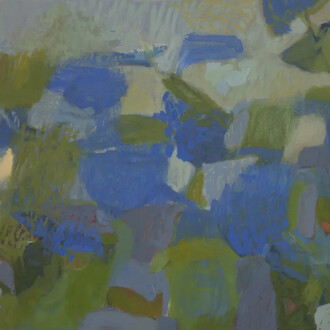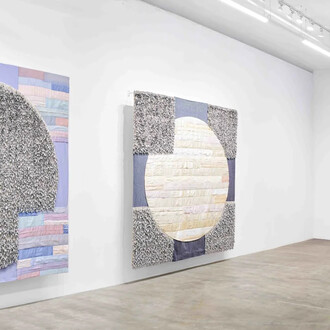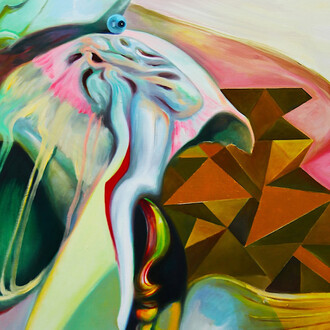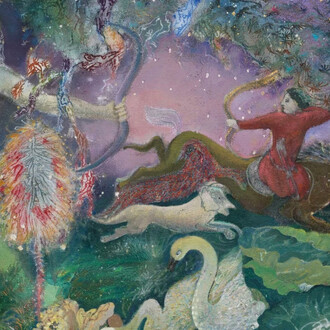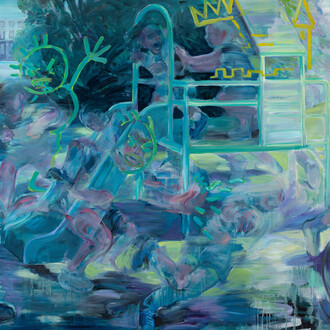It was chance that changed Zlatan Vehabović's practice and perspective on his own art-making after 17 years of work and progress in representational painting. Vehabovic had strived to capture several narratives in a single painting, a single image, what he calls ‘‘narrative possibilities”.
But chance brought about a moment that would change his practice. A small painting was leaning against a larger painting in such a way that “both were made to awkwardly cohabit and inform one another in such a way that a new ‘reading’ of this situation became a more complicated thing”. The resulting image was an entirely new creation, “a thing larger than the sum of its parts”. What Vehabovic found to be “particularly fascinating was that [in] this relation […] each viewer is made to produce meaning by whatever means they have at their disposal”.
And so, chance sparked the collage. He says, “juxtaposing two disparate things to produce a third […] opened up a world of new possibilities in painting. It constantly pulls the rug of expected meaning from under your feet […] while shifting focus to the most basic tools of visual language, such as composition, color, contrast, or shape”.
A central painting of the exhibition, which bears the same title, is set in “a somewhat typical turn-of-the-century interior of Zagreb in the early 19th century, as part of the Austro-Hungarian Empire”. While the salon space’s volume is beautifully rendered in monochrome, there’s a jarring juxtaposition with the colorful ‘cut outs’ superimposed over this scene of serenity. Not only is it a saturated and vibrant color juxtaposed with monochrome, but it is also a pictorial rendering of a three-dimensional space overlaid with flat segments of space, breaking up the scene and forcing us to either jump from one to the other or find a way to assimilate the two. We are left to grapple with these contrasts and layers.
The Academy of Fine Arts in Zagreb was founded in 1907, the first in Central Europe, with its core philosophy “to place the main emphasis on drawing as the first principle in art. Countless generations, myself included”, says Zlatan, “were initiated into art by that very principle”. The title of this work and of this exhibition refer to this, this Raging school of thought.
The gallery is pleased to present The school of raging thought, Zlatan Vehabović’s fourth solo exhibition with the gallery. The exhibition marks the introduction of collage into his artistic practice. The works fall into two distinct groups:
The first group consists of true collages - images that undergo a two-step manipulation process. First, the images are digitally manipulated before printing, and then the pieces are physically cut and arranged on the canvas. The second group consists of traditional oil paintings on canvas, but with a fresh approach. Vehabović deconstructs the representational mode he has used for the past 17 years by integrating the logic of collage into painting. These works mimic a "cut and paste" method, not through physical layering, but by masking and segmenting different sections on a single layer of canvas.
Zlatan Vehabović received his Ph.D. in painting from the Academy of Fine Arts in Zagreb. He lives and works in Zagreb, Croatia. Vehabović is one of Croatia's most acclaimed young artists, having won first prize at the 2010 Zagreb Salon, the 2010 International Association of Art Critics (AICA) Award, and an Essl Award in 2007. Selected solo exhibitions include The National Museum of Modern Art, Zagreb (2023), Kula Gallery, Split (2022), and in 2013 and 2011 at Lauba Museum in Zagreb. Selected group exhibitions include: Shadowland, Marc Straus, New York (2024), University Gallery, Split (2023), Revoltella Museum, Trieste, Italy (2022), Museum of Contemporary Art, Zagreb (2019, 2018, 2012, 2011), European Central Bank, Frankfurt (2019), The Knoxville Museum of Art (2011), Essl Museum (2009), Paolo Maria Deanesi Gallery, Rovereto, Italy (2010), Museum of Contemporary Art, Pula (2010, 2009), Werket Museum, Avesta Sweden (2008), and S&G Galleries, Berlin (2008). Vehabovic serves as a Professor of Painting at the Academy of Fine Arts in Zagreb.





